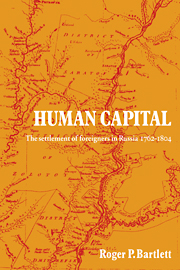Book contents
- Frontmatter
- Contents
- Weights and measures
- Abbreviations
- Preface
- Introduction
- I Antecedents
- 2 Catherine II and the Manifestos of 1762 and 1763
- 3 The response: settlement 1763–1775
- 4 Southern Russia 1764—1796
- 5 Urban and entrepreneurial settlement under the 1763 Manifesto
- 6 Immigration and colonies 1797–1804
- Conclusion
- Appendices
- Notes
- Bibliography
- Index
6 - Immigration and colonies 1797–1804
Published online by Cambridge University Press: 05 May 2010
- Frontmatter
- Contents
- Weights and measures
- Abbreviations
- Preface
- Introduction
- I Antecedents
- 2 Catherine II and the Manifestos of 1762 and 1763
- 3 The response: settlement 1763–1775
- 4 Southern Russia 1764—1796
- 5 Urban and entrepreneurial settlement under the 1763 Manifesto
- 6 Immigration and colonies 1797–1804
- Conclusion
- Appendices
- Notes
- Bibliography
- Index
Summary
General policy on immigration
Catherine II died in November 1796 and was succeeded by her son, Paul. The brief reign of the new Emperor (1796–1801) was distinguished, according to one nationalistic Russian writer, ‘by a quite parental concern for the foreign colonists’. This is a somewhat extreme view, though not without its element of truth. Under Paul, thorough surveys of the colonies were conducted, and generous efforts made to improve their condition. In fact, however, these activities formed part of a much wider process, a deliberate and comprehensive effort by the government to systematize and develop certain areas of the economy. For this purpose there was created in 1797 a new ‘Board (Ekspeditsiya) of State Economy, Guardianship of Foreigners and Rural Husbandry’, attached to the Senate, and under the overall charge of the Procurator–General. The new organ's sphere of competence was defined as, initially, ‘all those things which under individual administrations already existing – as for instance commerce, manufactures, and matters pertaining to mining, salt and spirits – are relevant in general to a consideration of the state economy, to draw up further measures as We shall desire’. The Board was further to discover ‘reliable and useful means to improve the condition of agriculture, arts, crafts and various manufacturing trades (remesl, khudozhestv, raznykh rukodeliy), of factories and works, and in general everything relating to the real advantage of the state in internal and external trade’.
- Type
- Chapter
- Information
- Human CapitalThe Settlement of Foreigners in Russia 1762–1804, pp. 180 - 229Publisher: Cambridge University PressPrint publication year: 1979



